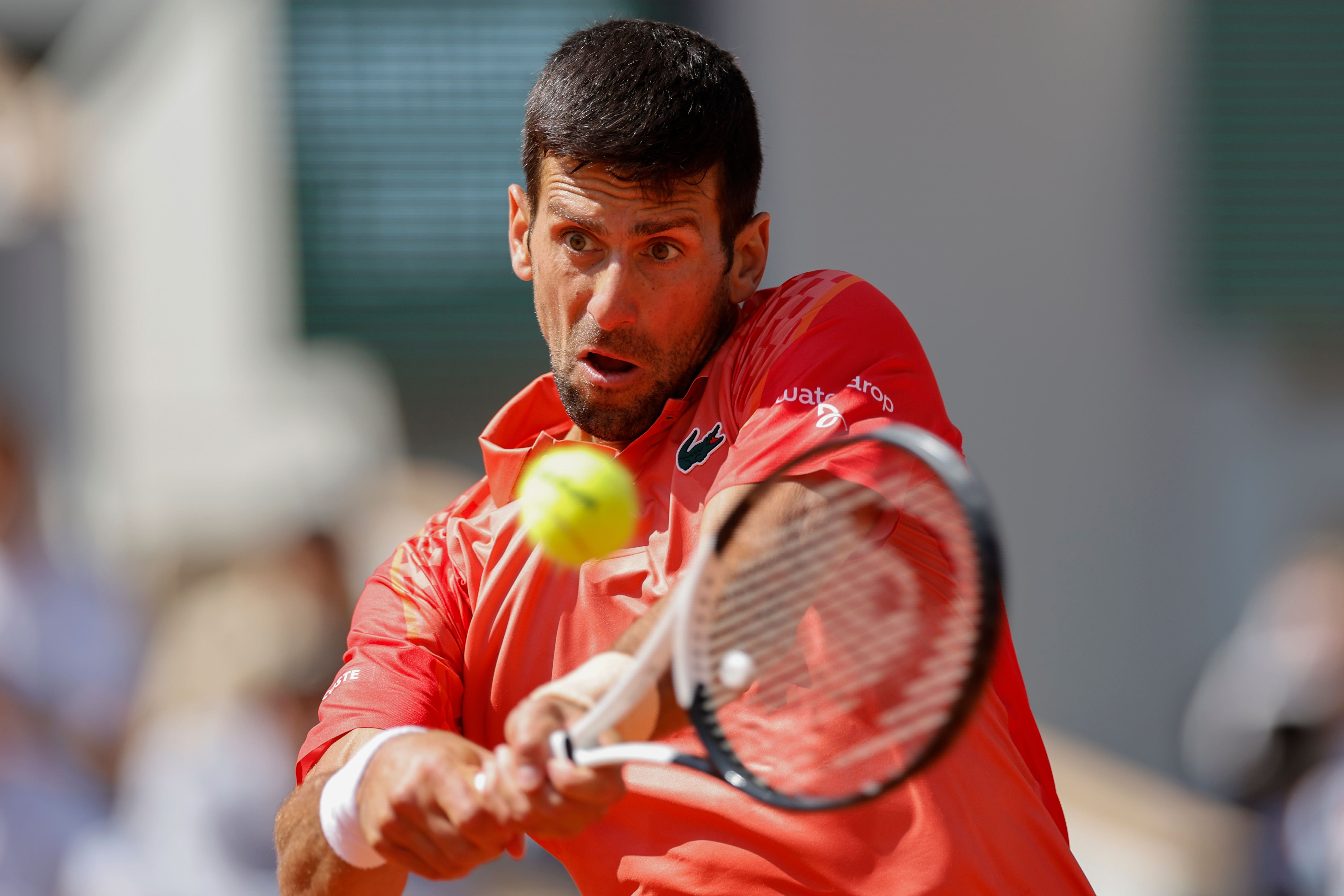Novak Djokovic sends political message about Kosovo after French Open win
Djokovic wrote on the camera lens “Kosovo is the heart of Serbia” after beating Aleksandar Kovacevic

Your support helps us to tell the story
From reproductive rights to climate change to Big Tech, The Independent is on the ground when the story is developing. Whether it's investigating the financials of Elon Musk's pro-Trump PAC or producing our latest documentary, 'The A Word', which shines a light on the American women fighting for reproductive rights, we know how important it is to parse out the facts from the messaging.
At such a critical moment in US history, we need reporters on the ground. Your donation allows us to keep sending journalists to speak to both sides of the story.
The Independent is trusted by Americans across the entire political spectrum. And unlike many other quality news outlets, we choose not to lock Americans out of our reporting and analysis with paywalls. We believe quality journalism should be available to everyone, paid for by those who can afford it.
Your support makes all the difference.Novak Djokovic eased into the second round of the French Open but risked inflaming political tensions in his home region with a message about Kosovo.
After a 6-3 6-2 7-6 (1) victory over American Aleksandar Kovacevic, who is of Serbian heritage, Djokovic wrote on the camera lens: “Kosovo is the heart of Serbia. Stop the violence.”
Kosovo declared independence in 2008 but Serbia has never recognised that and violence broke out in the north of the country over the weekend after ethnic Albanian mayors were installed in Serbian-dominated areas, with NATO peacekeepers among those injured.
Serbia has troops stationed near the border and there are fears of a return to the violent conflict of 1998-99.
Speaking to Serbian journalists in comments reported by the country’s media, Djokovic, whose father was born in Kosovo, said: “I am not a politician, nor do I intend to enter into debates.
“As a Serb, it hurts me what is happening in Kosovo. Our people have been expelled from the municipalities. This is the least I could do. As a public figure, I feel an obligation to show support for our people and all of Serbia.
“I hear there was a lot of criticism on social media. I don’t know if someone will punish me or something like that, but I would do it again. I am against wars and conflicts of any kind.
“Kosovo is our heart, stronghold, the centre of the most important events, the biggest battle took place there, the most monasteries. There are many reasons why I wrote this.”
The Serbia football team were fined by FIFA at the World Cup in November after a flag showing Kosovo as part of the country was displayed in their changing room, but Djokovic is not expected to face any sanctions.
Djokovic is, of course, no stranger to controversy and he was dragged into a row at the Australian Open in January after his father Srdjan was pictured with pro-Russia demonstrators, which he later insisted was unwitting.
On the court, there were no real alarms for the third seed, who has struggled on clay so far this season but maintained his record of not dropping a set in the opening round in Paris since 2010.
I don't know if someone will punish me or something like that, but I would do it again
He was broken serving for the match but responded with a strong tie-break, and said: “I think I played really well and held things under control for two-and-a-half sets and then lost my serve and things got a little bit on a wrong side for me.
“But I managed to hold my nerves and played pretty much a perfect tie-break. So overall I’m pleased and content with my level.”
Djokovic could meet Carlos Alcaraz in the semi-finals and the top seed also impressed in a 6-0 6-2 7-5 victory over Italian qualifier Flavio Cobolli, delighting a packed Suzanne Lenglen arena with some flamboyant shots.
Alcaraz won the first eight games of the match, and he said: “I felt I couldn’t lose a game. I thought that I was able to win easier than I did but a match can turn around in each game. But, at the start of the match, I felt invincible.”
Elsewhere, 10th seed Felix Auger-Aliassime’s difficulties continued as, struggling with illness, he lost in straight sets to Fabio Fognini, while another veteran, former champion Stan Wawrinka, battled past Albert Ramos-Vinolas in five sets.
The 38-year-old Swiss conducted the crowd like an orchestra at the end, and he said: “It is one of the main reasons why I keep playing. It’s to play those big tournaments like here, to have such an amazing atmosphere. I have so much support and it gives me a lot of emotion to win those matches.”
There was disappointment for former finalist Dominic Thiem, though, who remains without a grand slam victory since wrist problems two years ago after going down in five sets to Pedro Cachin.



Join our commenting forum
Join thought-provoking conversations, follow other Independent readers and see their replies
Comments